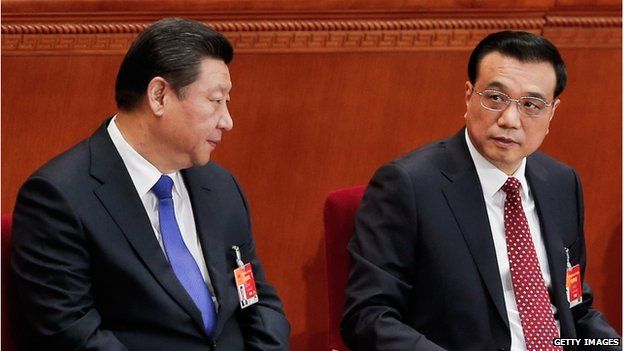China breaks the economic bad news gently
- Published

What do you do if you're the leader of the world's second largest economy - and you're set to announce your country's lowest economic growth target in 24 years?
Li Keqiang, the premier of China, faced that question as he delivered a lengthy speech marking the start of China's annual parliamentary session. At the heart of the speech: Beijing's forecast of 7% GDP growth in the coming year.
Many other politicians would be thrilled to unveil that figure. But for China, it's a let-down after years of double digit expansion.
So, how did Mr Li break the news?
Very carefully, it seems.
First, the state media spent weeks priming audiences to accept the "new normal" of slower economic growth. Moderate growth is a good thing, experts explained, because it indicates China is becoming a more mature, balanced economy.
So, there was little surprise when Mr Li referenced the "new normal" when speaking about the coming year.
The premier also took pains to show that he was in touch with the real problems facing the economy. Using plain-spoken language, in Chinese and in the official English translation, he admitted that investment was "sluggish" and the country's growth model was "inefficient".
The government's work must be improved in many areas, he noted, conceding "a small number of government employees behave irresponsibly, shocking cases of corruption still exist; and some government officials are neglectful of their duties."
With self-flagellation about the past out of the way, the premier turned to the future.
He outlined ways that China's leaders are planning to restructure the economy by reducing price controls and overhauling the opaque tax system. Ten million new jobs will be created in China's cities, the premier promised, and the state would continue to fund ambitious stimulus projects.
Few of the ideas outlined in the work report were new; but Li Keqiang reaffirmed the government's commitment to reform.
Lastly, Mr Li made things easier for himself next year by warning that this slower rate of GDP growth would continue indefinitely. "If China's economy can grow at this rate for a relatively long time," he explained, "we will secure a more solid material foundation for modernisation."
In other words, the "new normal" shouldn't raise eyebrows next year.
- Published5 March 2015